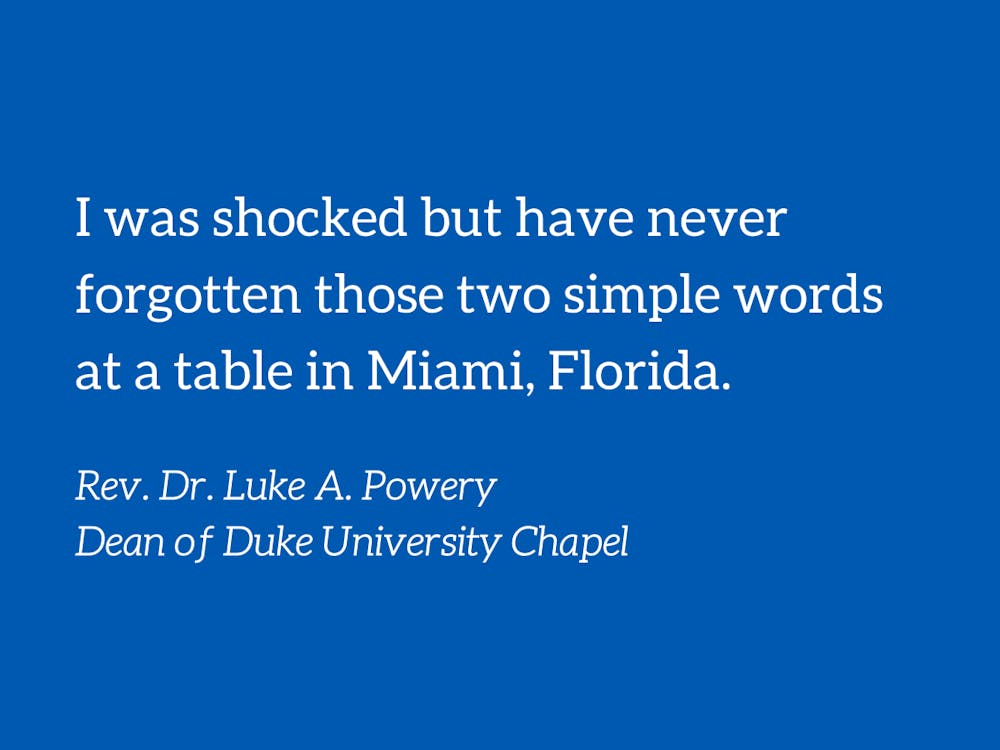My father is 88 years old now and a retired pastor, so I have heard him say many, many prayers during my lifetime, but there’s really only one that stands out.
One day, my father arrived home from work around dinner time and went upstairs to wash his hands in the bathroom. He eventually came downstairs and sat at the dinner table. I was ready for a longish prayer in his preacherly voice because his blessings at meals were often more like miniature sermons. Dad closed his eyes. Opened his mouth. And we were ready for him to recite the Apostle’s Creed, the Lord’s Prayer, some hymn lyrics, some scripture verses, some church history lessons, and the latest news, all in one prayer. Instead, when he prayed, all that he said was, “Thank ya!”
I was shocked but have never forgotten those two simple words at a table in Miami, Florida. Sometimes the best life lessons are the shortest ones—a memorable life lesson came that evening in the form of two simple words—“thank you.”
Those words may be the farthest thing from your mind right now. We are approaching an intense election. We are living through a global pandemic. We’ve been reminded of the racial tensions in this country. Who wants to think about or express gratitude? Thank you? That may seem like a waste of breath and time in the wake of social unrest and injustice. But I want to say that in our current circumstances it is as fitting as ever to say “thank you.” That’s because it is a sign that we truly understand our place as human beings in this mysterious and marvelous world, remembering that none of us are self-created but instead are in the long, long line of those who have come before us and have paved the way to today.
There are those who have leaned into giving thanks even during terrible times. In the ancient world, three colleagues—Paul, Silvanus, and Timothy—wrote a letter to a struggling church in Thessalonica that was experiencing persecution. They, too, were enduring tough times and suffering. But at the beginning of the letter, and actually throughout, these three friends express gratitude to God for others. They don’t start with their concerns, though they surely have them. They don’t begin with any complaints about their predicament or their worries about the future or anguish over civic injustice. They don’t even rant about the latest Facebook post on the upcoming election. Their very first words are full of thanksgiving. Gratitude is a priority for them in life. It is a top value in their leadership. They lead with thanksgiving.
In our present day, scientists are viewing thanksgiving as critical to the well-being of individuals. Research is showing that there are benefits to expressing gratitude. It can lead to healthier, more satisfying lives, greater energy, and a more generous outward-focusing life of service. Some people keep gratitude journals to cultivate this spirit of thanksgiving. There’s even a website at that aims to nurture gratitude in the lives of others.
Gratitude or thanksgiving can actually help you become more whole though you don’t express it in order to get something from it. Gratitude is other-oriented. In his spiritual memoir, My God and I, Lewis Smedes teaches that a gift “always [comes] with a person attached” and is more precious because a person is attached to it. He writes, “I do not understand how people can be thankful for a gift if they have no person to thank for giving it to them. We teach our children to say thank-you to their grandmother for her birthday gift; why should we not teach them to say thank you to God for the gift of their birth? …. Why should we not teach them that every new dawn of every morning, every drop of rain, every budding tulip, every blade of grass, every lovely thought we think, every wonderful feeling we feel, every memory of pleasure past, every tingle of pleasure present, every touch of a loved one’s finger, every hug from a laughing child, every note of a Mozart concerto, every coming home to our own place and people, every new hope that sees beyond a hard present—all of them are gifts with a Person attached?” On the other side of gratitude is a “you,” a person.
Thanksgiving opens up space in our hearts toward the hearts of others, even the holy Other. This mode of thanksgiving is not purely a one-time event spoken over a meal or one day we celebrate in November. It is a way of being in the world through all circumstances. The challenge is to lead our lives with gratitude even when life may be difficult—to wake up every morning when our feet hit the ground and let our first breath and first step in the new day be “thank you.” These two simple words receive the gift of life. Meister Johann Eckhart, a medieval mystic, sums it up well: “If the only prayer you ever say in your entire life is thank you, that will be enough.”
My hope is that you would make gratitude a habit and be sure to say, “thank ya.” Make a phone call this week and tell someone how much you appreciate them and why. Write a note thanking someone for encouraging you or helping you work through a problem or teaching you something new or just for being your faithful friend. Give thanks even to the One attached to all the gifts you’ve received because gratitude is a holy attitude toward the gift of life.
Thank you for reading.
Rev. Dr. Luke A. Powery is the Dean of Duke University Chapel. His column runs on alternate Mondays.
Get The Chronicle straight to your inbox
Signup for our weekly newsletter. Cancel at any time.

